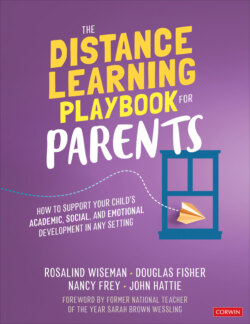Читать книгу The Distance Learning Playbook for Parents - Rosalind Wiseman - Страница 17
На сайте Литреса книга снята с продажи.
Ensure That Your Children Sleep
ОглавлениеTo sleep, perchance to dream. Yes, that’s a fragment of the Shakespeare quote, but it’s the part that gives us hope. Sleep is important. It’s as important as food, water, and physical and emotional safety. There is evidence that an extreme lack of sleep contributes to behavior problems, mood disturbances, emotional instability, and even obesity. In terms of the research, lack of sleep is one of the few things that has a definite negative effect size, or impact, on children’s learning.
There are two interesting outcomes from school closures. Some people are sleeping more, which is good—to a point. But some people, especially children, are not sleeping in a predictable pattern, which is not good.
SIMPLY SAID, CHILDREN WHO DO NOT GET SUFFICIENT SLEEP LEARN LESS.
Speaking of adolescents, there is some folklore that their natural circadian rhythms require that they go to sleep later and wake up later. To a point, that is true. Experts suggest that it is about an hour difference. The other shifts in their desire to go to sleep late are more social in nature. Importantly, teenagers need more sleep than adults. The National Sleep Foundation examined the research and gathered experts from the fields of psychology, anatomy and physiology, as well as from pediatrics, neurology, gerontology, and gynecology to reach a consensus. These are their recommendations:
Source: Adapted from Sleep Foundation (www.sleepfoundation.org).
As we noted earlier, routines are important. Sleep routines are especially important. To avoid a dramatic scene every night that results in tantrums (younger children) or highly irritating arguments (older children and teens), create an evening routine. Ensure that the TV and all tech devices are off at least one hour before bedtime. (A lot of online bullying occurs in the hour before and after lights-out.) We recognize that impacts you as well, but it is critical for quality sleep. Blue light can be stimulating and thus prevent our brains from sleeping (and there are special glasses and screen protectors that you can purchase to reduce the strain from this light during the day). As part of the bedtime routine for younger children, engage in the same quiet activities each night, such as reading a book together, singing songs, completing a task—just make it familiar and routine. For older children, set expectations and be aware of their use of technology in their bedrooms after they have supposedly gone to bed. Some families have found success by instituting a routine about collecting devices at bedtime and keeping them in the parent’s bedroom until the following morning.
If your child is not getting enough sleep or is going to bed too late, develop a ten-day plan to improve this. It’s too hard to suddenly change the bedtime as your child is likely to lay in bed unable to sleep. Instead, identify the number of minutes gap between the ideal time and the current time (for example, 8 p.m. versus 10 p.m.). That’s 120 minutes. Divide by 10 and move back bedtime by that amount each night.
LACK OF SLEEP IS ONE OF THE FEW THINGS THAT HAS A DEFINITE NEGATIVE EFFECT.
Sleep, both in terms of quantity and quality, is an important yet often neglected aspect of schooling. Simply said, children who do not get sufficient sleep learn less. These are the key messages:
➔ Sleep impacts learning.
➔ Add nighttime activities and expectations to your list of routines.
➔ Establish bedtimes and stick to them.
➔ Avoid electronics that emit blue light one hour before bedtime.
➔ If necessary, keep a sleep journal, or ask your child to do one for two weeks, to determine if your child is getting enough sleep.
